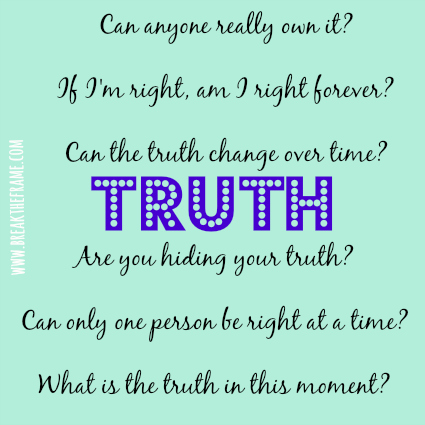A week ago, I went to an art exhibit of Rembrandt prints at Columbia University. At first glance, it looked like a simple series of black and white prints lining the walls. It appeared interesting but far from exciting.
I enjoy art, but this seemed like an exhibit I’d likely zip through if I was there on my own; luckily I wasn’t. The friend who brought me was a good friend of the curator and he gave us a tour; it was incredible. Not only did I learn a tremendous amount about Rembrandt and his etchings, but also about who owns truth and how the truth evolves over time.
Is it even possible for someone to own the truth? I mean, there are subjective thoughts and objective facts, right? When I was working as an employee inside of corporations, I was taught early on that facts were not up for debate and it was my job to know and understand the facts inside and out. It’s a very black and white view of leadership – right and wrong, cut and dry, truth and… lies? However, evolution of thoughts, innovation and creativity can take facts and make them quickly obsolete.
As the curator was sharing with us some of the debate around one of the series of prints, another person on our small tour made a very astute observation and comment:
“It seems you have a better argument and you own the truth in this moment.”
Can Anyone Own the Truth?
The facts around the Rembrandt etchings and which came first, second, third etc have been up for debate and cataloged in the 300+ years since his death. Every time we learn more, good assumptions are changed into facts and then proven wrong. It’s not only fascinating to consider, but also makes it clear that the truth in this moment is more than fixed or fleeting; it’s a critical stepping stone connecting the past to the future through this moment.
Owning the truth of the moment does not make you right, it means that you are a seeker willing to accept that new discoveries are a part of the evolution of human understanding. We need to welcome these new insights and not lament that we’re now wrong when we were once right. This is a cornerstone of the growth of shared consciousness.
Owning Your Truth
Most of us are obsessed with moving forward, taking less than ideal circumstances and showing the world how far we’ve come. However, denying your past, or rushing through your present to a better future is missing out key parts of who you are and how you got here.
I’ve met leaders who I respect and admire yet have no idea about their early history or the mistakes that they made along the way. They are shining examples of excellence but never let on that they ever had a chip in their professional or personal veneer. Their truth is obscured not only to their teams, families and friends but oftentimes from themselves as well.
Owning your truth means that you stop being scared to share it. No worries about how others will judge you or put you in a box. It’s who you are, what you believe and your life experience. It’s beautiful when you discover that vulnerability and courage are what makes you strong, not denial and bravado.
Accepting a New Story
I appreciated that the curator of the Rembrandt exhibit didn’t believe that he wrote a final chapter in a long tome with his new insights. His exhibit tells us what we know today. His fresh perspective adds layers to a story that has been cataloged and told yet will continue to unfold.
Just this afternoon, I was talking to an organization that supports women with breast cancer and the BRCA gene. We discussed how I believe that my treatment was the right one based on the knowledge of the medical field today; it likely saved my life. However, necessity doesn’t make it easy or less barbaric. It’s my hope that a generation from now we’ll know more and have new treatments that keep people whole and living a long and healthy life.
Break the Frame Action:
Allow room for the truth to evolve. Holding on to old facts and stories does not serve you. The next time someone comes to you with new ideas that contradict your own long-held beliefs, listen before you dismiss or tell them they’re wrong. It may be you who no longer owns the truth in this moment. This is an opportunity to create a new story… together.
[Tweet “The only truth you can really own is your own.”]



Alli,
An element of patience in understanding truth is vital, as well as absorbing in the different perspectives and then maybe making a choice of truth. All this can be confusing and painful, especially as it impacts our health or the health of those around us. Problem solving requires a truth of patience and trust in our capability to listen, discern, decide, and move forward.
Great thoughts and wishing you the best,
Jon
Jon – The addition of patience is key. We are often in a rush to fix, increase results and make immediate changes and patience opens the door to understanding and meaning.
Thank you!
~ Alli
Fantastic post Alli and welcome back my friend!
The truth for each of us does often evolve as our experiences and knowledge changes. I have learned not to judge others even if they’re perspective seems way different from mine. I see this in all of my workshops and I try to adjust my lens to different views.
Thanks Alli and so thrilled to see you and your inspirational words !!!
Terri –
Judgement seems to be the default for a lot of people. Love that you’ve cultivated the ability to listen and understand through the differences instead of digging in deeper. What a gift to the people in your workshops!
~ Alli